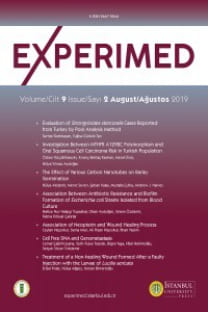Beyaz Lahana Ekstresi Amiodaronun Sıçanlarda Kalp Dokusu Üzerindeki Zararlı Etkilerini İyileştirir
Amiodaron, yan etki, beyaz lahana
White Cabbage Extract Reduces the Harmful Effects of Amiodarone on Heart Tissue in Rats
Amiodarone, side effect, white cabbage,
___
- 1. Oliveira PF, Dias da Silva VJ, Salgado MCO, Fazan Jr. R, Aguiar CA, Salgado HC. Acute effect of amiodarone on cardiovascular reflexes of normotensive and renal hypertensive rats. Braz J Med Biol Res 2005; 38(6): 967-76. [CrossRef]
- 2. Hughes M, Binning A. Intravenous amiodarone in intensive care. Intensive Care Med 2000; 26: 1730-39. [CrossRef]
- 3. Rao RH, McCready VR, Spathis GS. Iodine kinetic studies during amiodarone treatment. J Clin Endocrinol Metab 1986; 62: 563-8. [CrossRef]
- 4. Narayana SK, Woods DR, Boos CJ. Management of amiodarone-related thyroid problems. TAEM 2011; 2(3): 115-26. [CrossRef]
- 5. Basaria S, Cooper DS. Amiodarone and the thyroid. Am J Med 2005; 118(7): 706-14. [CrossRef]
- 6. Bogazzi F, Bartalena L, Gasperi M, Braverman LE, Martino E. The various effects of amiodarone on thyroid function. Thyroid 2001; 11(5):511-9. [CrossRef]
- 7. Singh J, Upadhyay AK, Bahadur A, Singh B, Singh KP, Rai M. Antioxidant phytochemicals in cabbage (Brassica oleracea L. var. capitata) Sci Hortic 2006; 108(3): 233-37. [CrossRef]
- 8. Nieuwhof M. Cole Crops: Botany, Cultivation and Utilization. World Crops Series. Leonard Hill, London, UK, 1969; pp353.
- 9. DeFilipps RA, Krupnick GA. The medicinal plants of Myanmar. PhytoKeys 2018; 28;(102): 1-341. [CrossRef]
- 10. Wells PG, McCallum GP, Chen CS, Henderson JT, Lee CJ, Perstin J, et al. Oxidative stress in developmental origins of disease: teratogenesis, neurodevelopmental deficits, and cancer. Toxicol Sci 2009;108: 4-18. [CrossRef]
- 11. Lapenna D, Ciofani G, Bruno C, Pierdomenico SD, Cuccurullo F. Antioxidant activity of amiodarone on human lipoprotein oxidation. BJP 2001; 133(5): 739-45. [CrossRef]
- 12. Felser A, Blum K, Lindinger PW, Bouitbir J, Krähenbüh S. Mechanisms of hepatocellular toxicity associated with dronedarone--A comparison to amiodarone. Toxicol Sci 2013; 131(2): 480-90. [CrossRef]
- 13. Lewis JH, Ranard RC, Caruso A, Jackson LK, Mullick F, Ishak KG, et al. Amiodarone hepatotoxicity: Prevalence and clinicopathologic correlations among 104 patients. Hepatology 1989; 9: 679-85. [CrossRef]
- 14. Waldhauser KM, Török M, Ha HR, Thomet U, Konrad D, Brecht K, et al. Hepatocellular toxicity and pharmacological effect of amiodarone and amiodarone derivatives. J. Pharmacol Exp Ther 2006; 319: 1413-23. [CrossRef]
- 15. Brown DA, Perry JB, Allen ME, et al. Expert consensus document: Mitochondrial function as a therapeutic target in heart failure. Nat Rev Cardiol. 2017;14(4): 238-50. [CrossRef]
- 16. Lowry OH, Rosebrough NJ, Farr AL, Randall RJ. Protein measurement with the Folin phenol reagent. J Biol Chem 1951; 193(1): 265-75.
- 17. Yagi K. Assay for blood plasma or serum. Methods Enzymol 1984; 105: 328-37. [CrossRef] 18. Beutler E. Gluthatione: red cell metabolism. A manual bio chemical methods. New York: Grune and Stratton; 1975.
- 19. Aebi H. Catalase in vitro. In: Bergmeye HU, editor. Methods of enzymatic analysis. Wenheim: Verlag Chemie; 1974. [CrossRef]
- 20. Mylorie AA, Collins H, Umbles C, Kyle J. Erythrocyte SOD activity and other parameters of copper status in rats ingesting lead acetate. Toxicol Appl Pharmacol 1986; 82: 512-20. [CrossRef]
- 21. Habig WH, Jacoby WB. Assays for differentation of glutathi one-Stransferases. Methods Enzymol 1981; 77: 398-405. [CrossRef]
- 22. Warren L. The thiobarbituric acid assay of sialic acids. J Biol Chem 1959; 234: 1971-75.
- 23. Ingram GIC, Hills M. Reference method for the one stage prothrombin time test on human blood. Thromb Haemostas 1976; 36: 237-8. [CrossRef]
- 24. Brooks JD, Paton VG, Vidanes G. Potent induction of phase 2 enzymes in human prostate cells by sulforaphane. Cancer Epidemiol Biomarkers Prev 2001; 10(9): 949-54.
- 25. Dekker M, Verkerk R, Jongen WM. Predictive modelling of health aspects in the food production chain: a case study on glucosinolates in cabbage. Trends Food Sci 2000; 11: 174-81. [CrossRef]
- 26. Ji C, Li C, Gong W, Niu H, Huang W. Hypolipidemic action of hydroxycinnamic acids from cabbage (Brassica oleracea L. var. capitata) on hypercholesterolaemic rat in relation to its antioxidant activity. J Food Nutr Res 2015; 3(5): 317-24. [CrossRef]
- 27. Simin N, Orcic D, Cetojevic-Simin D, Mimica-Dukic N, Anackov G, Beara I, Bozin B. Phenolic profile, antioxidant, anti-inflammatory and cytotoxic activities of small yellow onion (Allium flavum L. subsp. flavum, Alliaceae). LWT-Food Sci Technol 2013; 54(1): 13946. [CrossRef]
- 28. Chakraborty A, Mondal C, Sinha S, Mandal J, Chandra AK. Amiodarone induced oxidative stress in stress - vulnerable organs of adult male rats. Asian J Pharm Clin Res. 2014; 7: 4:177-83.
- 29. Ponnio M, Alho H, Nikkari ST, Olsson U, Ryderberg U, Sillanaukee P. Serum sialic acid in a random sample of the general population. Clin Chem 1999; 45: 1842-9. [CrossRef]
- 30. Breitenstein A, Stämpfli SF, Camici GG, Akhmedov A, Ha H, Follath F, et al. Amiodarone inhibits arterial thrombus formation and tissue factor translation. Arter Thromb Vasc Biol 2008;28: 2231-8. [CrossRef]
- 31. Khan R.A, Asad Ti, Feroz Z, Ahmed M. In vıvo examinatıon of the anticoagulant effect of the Brassica oleracea methanol extract. Arch Biol Sci Belgrade 2015; 67(2), 631-8. [CrossRef]
- Yayın Aralığı: Yılda 3 Sayı
- Başlangıç: 2011
- Yayıncı: İstanbul Üniversitesi
Kanser ve Metastaz: Hücre Adezyon Molekülleri ve Hücreler Arası Bağlantıların Önemi
Gülçin ÖZKARA, Oğuz ÖZTÜRK, Hülya YILMAZ AYDOĞAN
Belen ŞİRİNOĞLU-ÇAPAN, Serap AKYÜZ, Burçin ALEV, Beste TACAL-ASLAN, Tanju KADİR, Ayşen YARAT
Beyaz Lahana Ekstresi Amiodaronun Sıçanlarda Kalp Dokusu Üzerindeki Zararlı Etkilerini İyileştirir
Hazal HAZİNECİ, İsmet Burcu TÜRKYILMAZ, Ünsal Veli ÜSTÜNDAĞ, Ebru EMEKLİ-ALTURFAN, Burçin Alev TÜZÜNER, Tuğba TUNALI-AKBAY, Refiye YANARDAĞ, Ayşen YARAT
Behçet Hastalığı’nda IL-10 Geni Ekspresyonu ve rs1554286 SNP İncelenmesi
Elçin ŞEHİTOĞLU TAŞAR, Elif UĞUREL, Erdem TÜZÜN, Burçak VURAL
Murat ÖZDEMİR, M. Tolgahan HAKAN, Dilara SÖNMEZ, Ali KAFADAR, İlhan YAYLIM, Özlem KÜÇÜKHÜSEYİN
Deneysel Diyabette Döteryum Azlığının Eritrositler Üzerine Etkisi
Madde İlişkili Psikotik Bozuklukların Tedavisinde Kullanılan Atipik Antipsikotikler
Melis KARAOĞLAN, Göksu KAŞARCI, Elif ŞAHİN, Elif Sinem İPLİK
